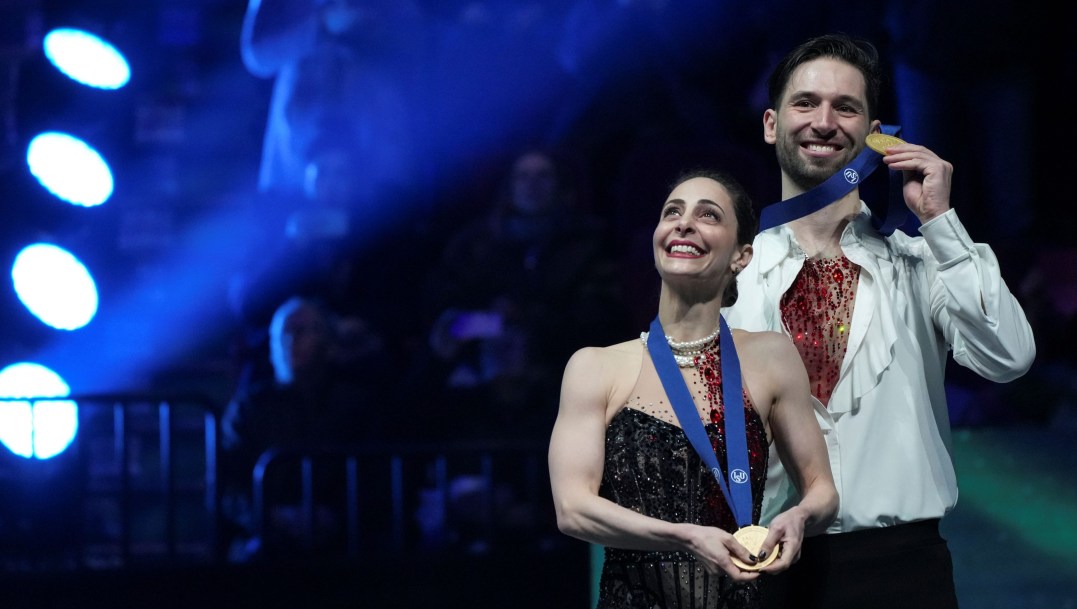World title at home is “dream come true” for figure skaters Stellato-Dudek & Deschamps
“Oh my God, did we do well?”
For Deanna Stellato-Dudek, the gold medal-winning free skate she performed with partner Maxime Deschamps on Thursday night at the ISU World Figure Skating Championships in Montreal felt like “I blinked and it was finished”.
When the victory became official, it was “a dream come true” and a moment “vraiment incroyable” for the duo, who at the ages of 40 and 32 are always defying the odds. Stellato-Dudek made history by becoming the oldest woman to ever win a world title in figure skating.
The emotions they were feeling were clear as they stood on the podium as the victors. While “O Canada” was sung by a choir, Stellato-Dudek didn’t fight the tears that flowed, but just went about wiping them away.
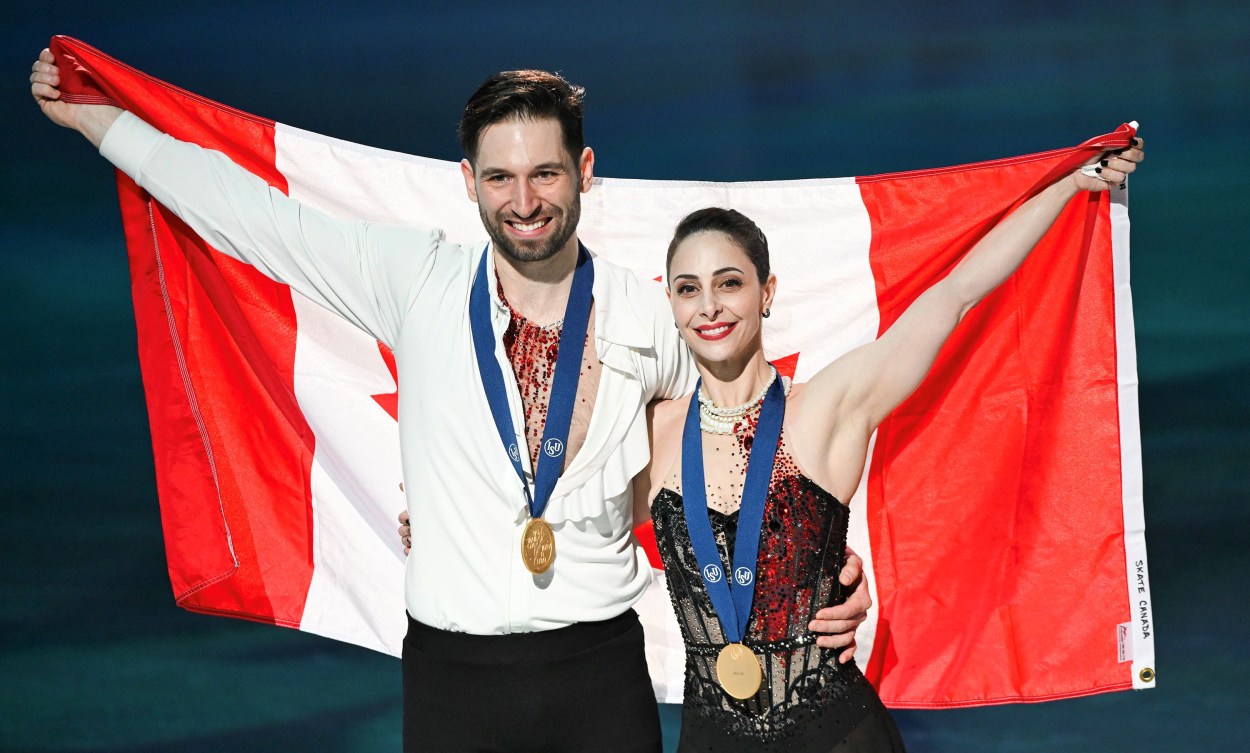
They admitted later that it had been a stressful day. Stellato-Dudek was little under the weather and was doubtful about how she could perform at her best in their biggest competition of the year. Her mindset wasn’t helped by a “terrible” warmup. But a pep talk from Deschamps and their coaches – “They said to me ‘if you’re gonna do this, you’re going to go out there and fight and give it everything you got’.” – sent them on their way to the top of the podium.
In their program set to the Interview with the Vampire soundtrack, there was just one small error, on a double axel at the end of a three-jump combination near the start of the program that has been a great vehicle for them all season. From there, they flew through their difficult technical elements, swept up in the support of the loud and proud Canadian crowd.
After nailing their final throw, a triple loop, there was just one lift remaining. Before Stellato-Dudek even hit her apex position atop Deschamps’ outstretched arm, the fans were on their feet, creating a deafening roar that took them into their final pose.
“We were lucky to have worlds here in Canada, as much pressure as we felt from it, the audience really carried us through the second half of that program,” she said.
“It’s incredible what I live here tonight,” said Deschamps. “We’re proud of what we’ve done and it was really fun to do it in front of the crowd.”
They scored a personal best 144.08 in the free skate for a personal best total score of 221.56. Having come in with almost a four-point cushion after the short program, only one team could catch them – the defending champions Riku Miura and Ryuichi Kihara of Japan. Though the Japanese ended up winning the free skate, it was by just 0.27, not nearly enough to make up the margin. They took the silver, while Germany’s Minerva Fabienne Hase and Nikita Volodin skated to bronze.
The Germans weren’t shy to acknowledge the respect they hold for the Canadians and the inspiration they draw from them.
“They grow so much over the past seasons,” said Hase. “Especially Deanna with your age, it’s like amazing, like really. […] A lot of motivation they give us for the next season.”
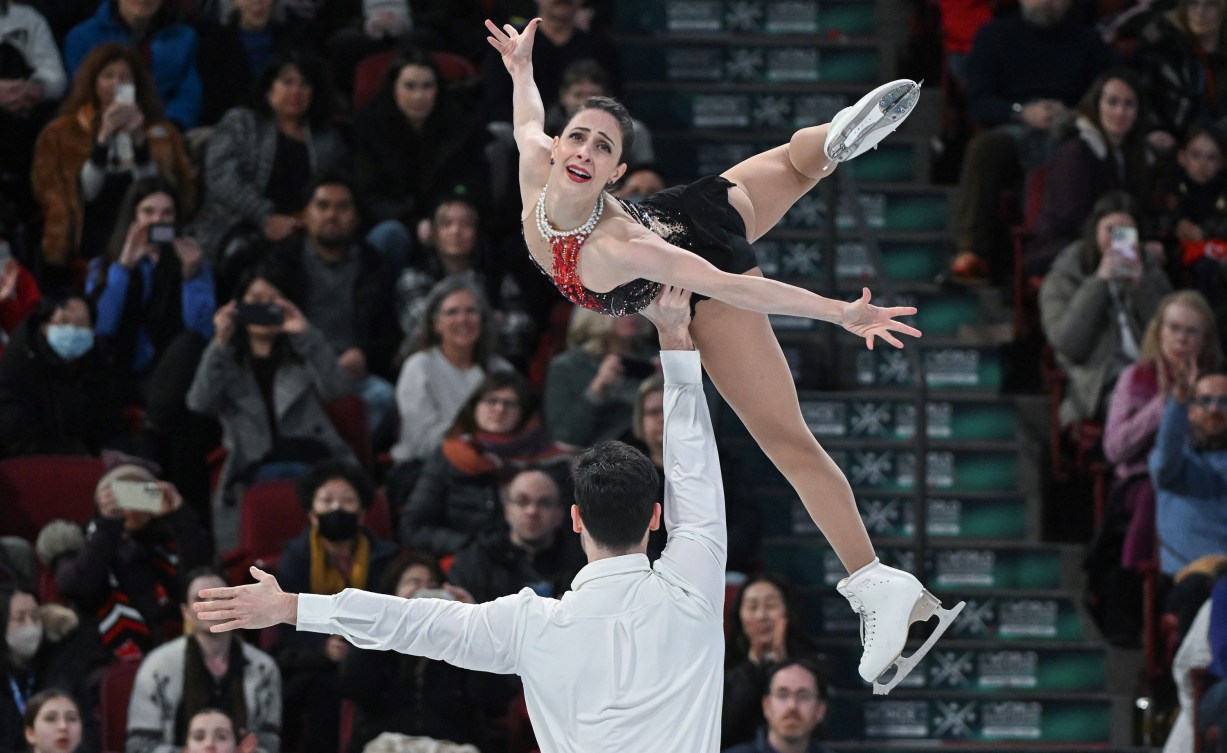
This was already the best season of Stellato-Dudek and Deschamps’ relatively short career together. It started with a string of three straight wins, including gold medals at both of their Grand Prix events, Skate Canada International and Cup of China. That was followed by a bronze medal at the Grand Prix Final. After winning their second straight national title, they captured gold at the ISU Four Continents Championships in early February.
But it has been a most unique rise to the top for both of them. Stellato-Dudek’s story has been defined by her 16-year break from the sport. Her incredible comeback led to her receiving an ISU Skating Special Achievement Award this year. But Deschamps has also endured his share of difficulties, including going through eight different partners with little success nationally before finding his perfect match in Stellato-Dudek.
“We both have different stories, but at the end we both have a lot of perseverance and determination to have been able to achieve what we have done. And all the experience we have gotten in very different ways we have been able to bring it together here,” said Deschamps.
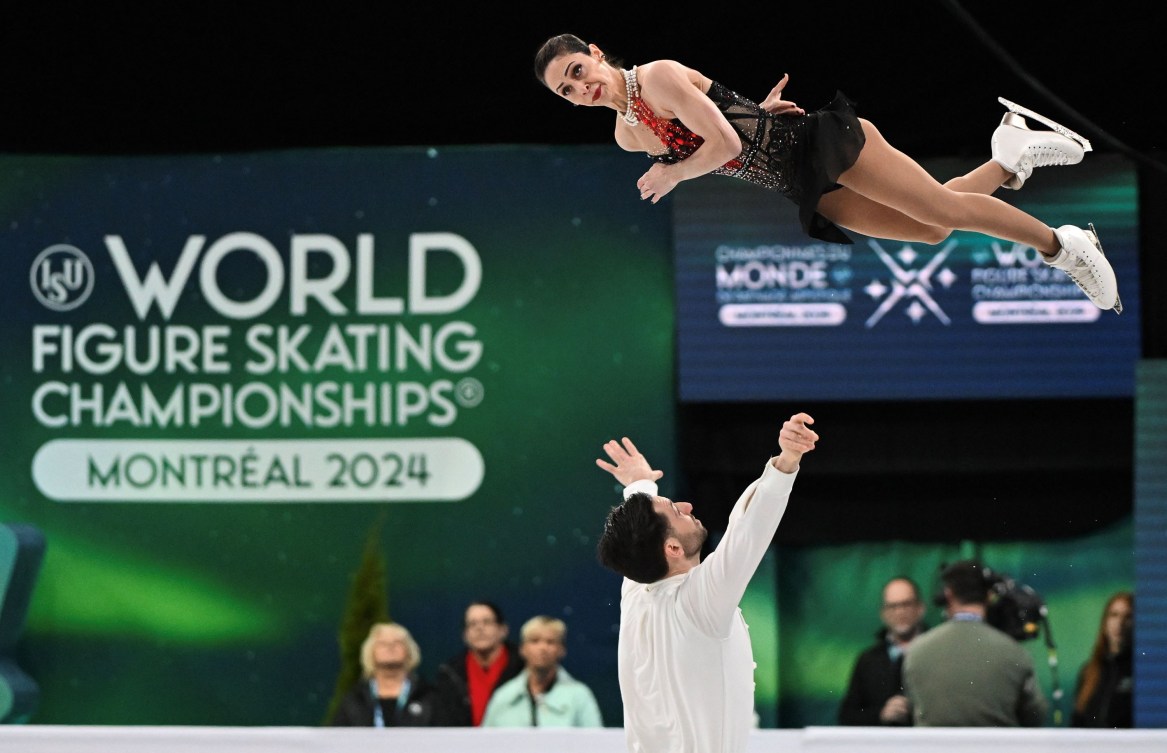
Hailing from the Chicago area, Stellato-Dudek had been a promising singles skater for the United States. She won silver at the 2000 World Junior Championships, defeating, among others, future Olympic silver medallist Sasha Cohen. But the following season, Stellato-Dudek sustained another in a series of hip injuries and decided to retire from competitive skating to embark on the next phase of her life – or so she thought.
Sixteen years after hanging up her skates, she was at a work retreat in her new career as an aesthetician. A question was asked to all attendees: What is something you would do if you knew you couldn’t fail? Her immediate response surprised even herself: I would win an Olympic gold medal.
She pulled her skates out of storage and went to a public skating session. Rediscovering her joy for the sport, she decided to attempt a comeback as a pairs skater, learning an entire new set of technical elements she had never done before. She was in her early 30s, an age at which most elite skaters are ending their careers.
After her partnership with a fellow American dissolved in 2019, a tryout with Deschamps was arranged. They clicked and decided to compete for Canada, even knowing that if she wanted to go after her Olympic gold medal dream, it wouldn’t be likely to happen until 2026 because it would take that long for her to obtain Canadian citizenship.
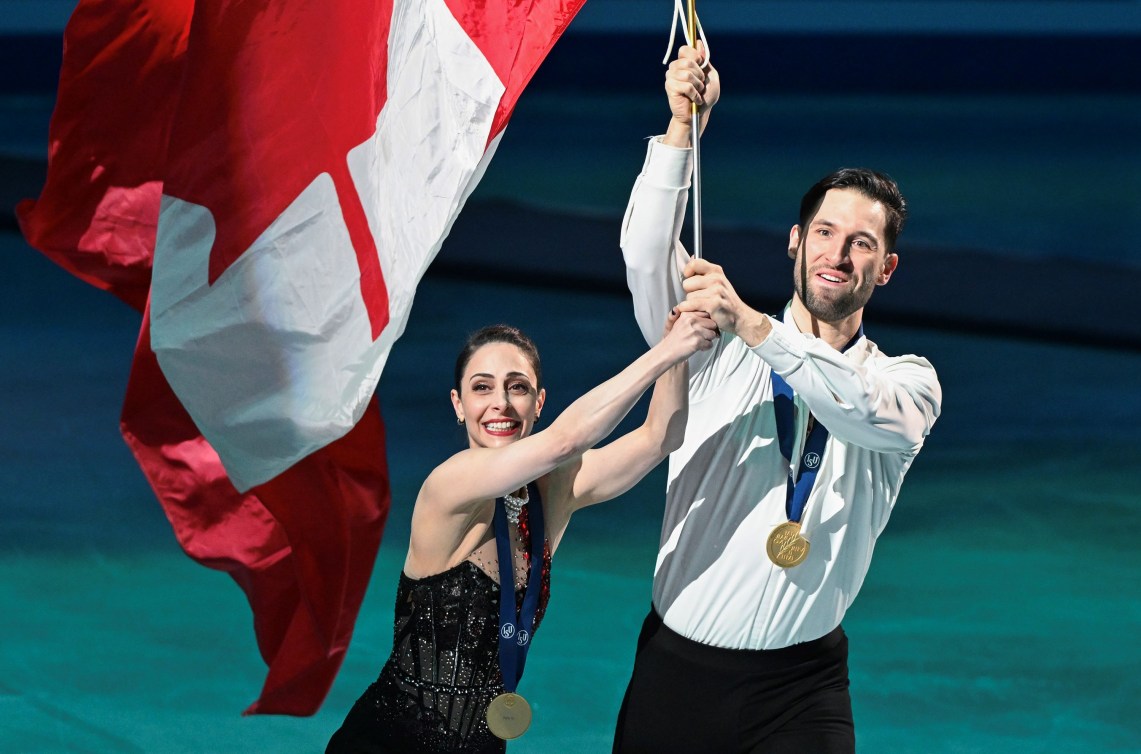
They began competing internationally in 2021-22 and in their world championship debut as a pair in 2023, they missed the podium by one spot. Having received her permanent resident card last year, she anticipates a Canadian passport isn’t too far away.
Before getting too far into the future, though, Stellato-Dudek and Deschamps will celebrate this world title they have worked so hard for in their own ways.
“I want to walk into Chanel and I want to buy something,” she said to laughs in the post-competition press conference.
“Eat a poutine, that’s probably tonight,” he commented before later adding that during Sunday’s gala he would really like to hold “le flambeau des Canadiens so maybe they can win again, bring a Stanley Cup back home. That would be really special.”
Roman Sadovsky gets his redemption in men’s short program
When Roman Sadovsky met with the media immediately after his short program, there was no mistaking the relief and happiness that flooded his face.
“That’s definitely what redemption looks like. That’s what training looks like,” were the first words out of his mouth.
With a trio of clean jumping passes – quad salchow, triple axel, and triple lutz-triple toe combo – Sadovsky had delivered a performance that made him feel better than he had felt after a short program in several seasons. “I definitely missed it.”
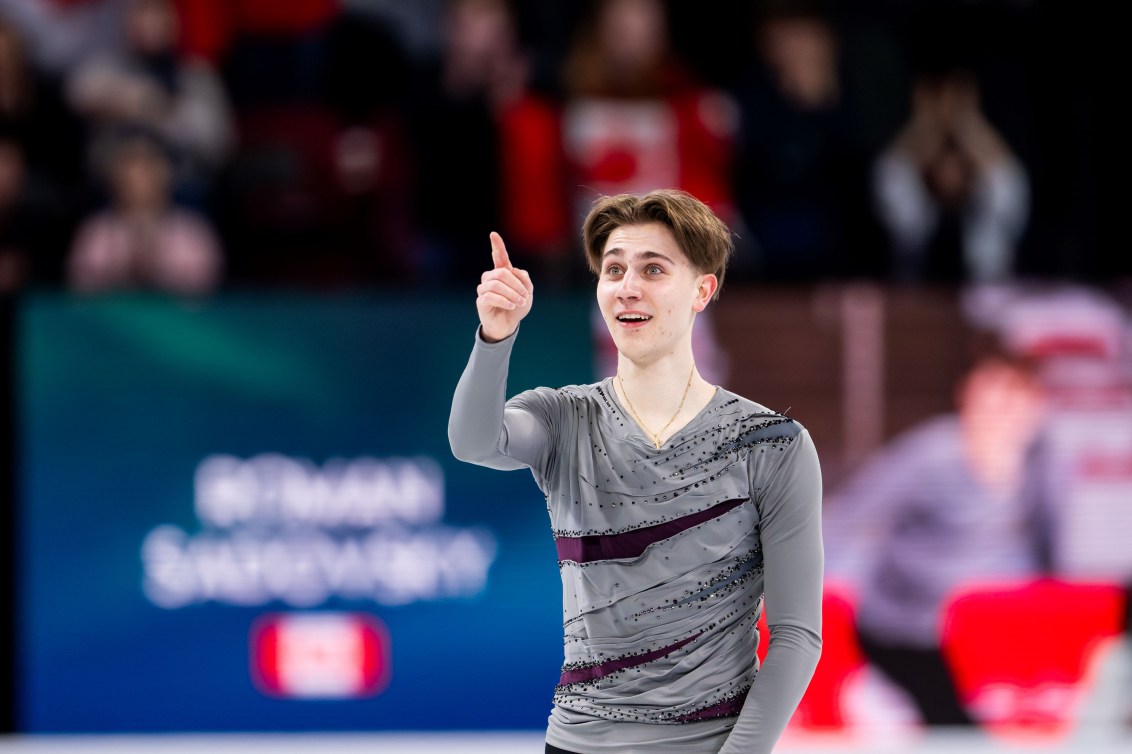
It led to him being ranked 11th for the day, putting him into the second last flight for Saturday’s free skate.
It was a great display of perseverance for Sadovsky, who unlike most of the other competitors, didn’t have much of a season to build on.
His travel travails throughout the fall and early winter were well-documented. Luggage was lost, a flight to Europe was unexpectedly turned back to Canada – all after he had withdrawn from his one Grand Prix assignment to ensure he had time to fully recover from an injury. It meant that he didn’t step onto competitive ice until the Canadian championships in January.
Sadovsky finished sixth there. He was sent to the ISU Four Continents Championships a couple weeks later where he didn’t attempt his most difficult technical content. What he did do was enough to earn him his second career world championship appearance.
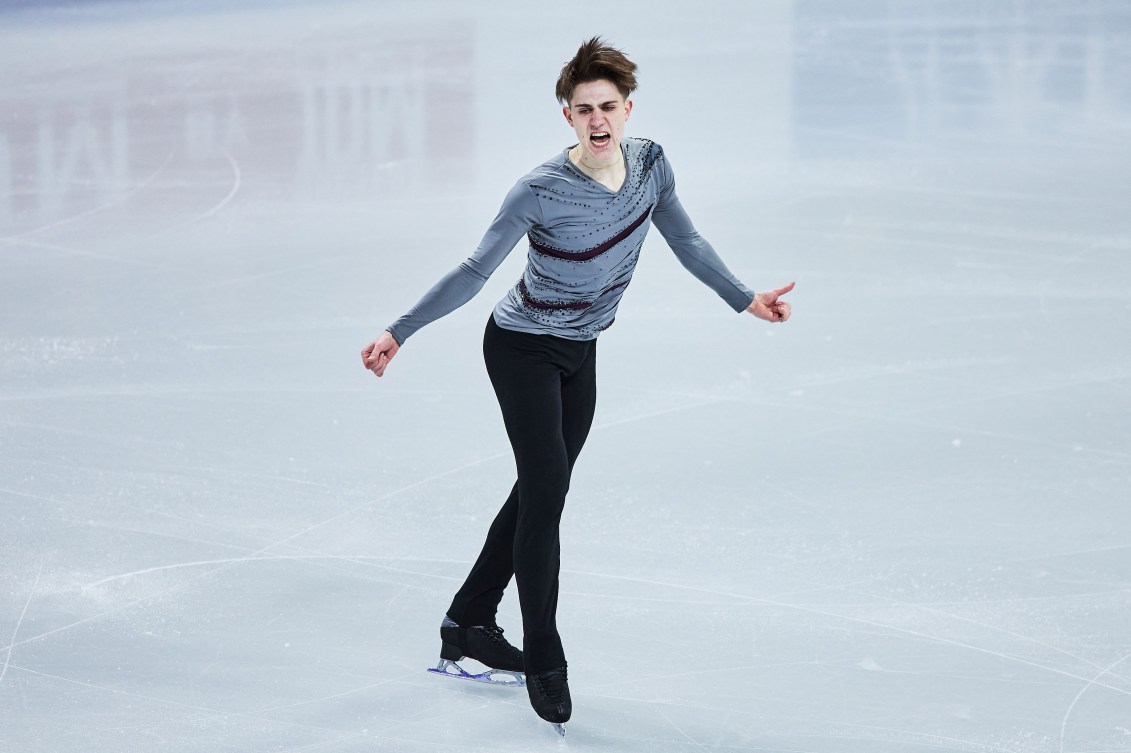
Able to spend the next few weeks getting in the training mileage he’d been missing, he came to Montreal incredibly prepared, but also super nervous.
“I feel like that’s kind of like a double whammy because the more prepared you are, the more you want to do well,” he said. But with that strong block of training to rely on, he made himself stay patient and calm, particularly in his approach to the big point-scoring jumps.
But it wasn’t the quad or triple Axel that was his favourite moment of the short program. That actually came as he took his bows, soaking in the standing ovation that roared around the building. He had been told by some other skaters to be sure to enjoy his time in front of the extremely loud fans who had made their enthusiasm known during the first day of competition on Wednesday.
“Seeing that recognition from thousands of people, it’s definitely a validating moment,” Sadovsky said. But even before that, he was fully aware of the cheers that erupted with each jump landed, with each sublime movement he made.
“Like bursting my eardrum so loud. It’s so good, so so good.”
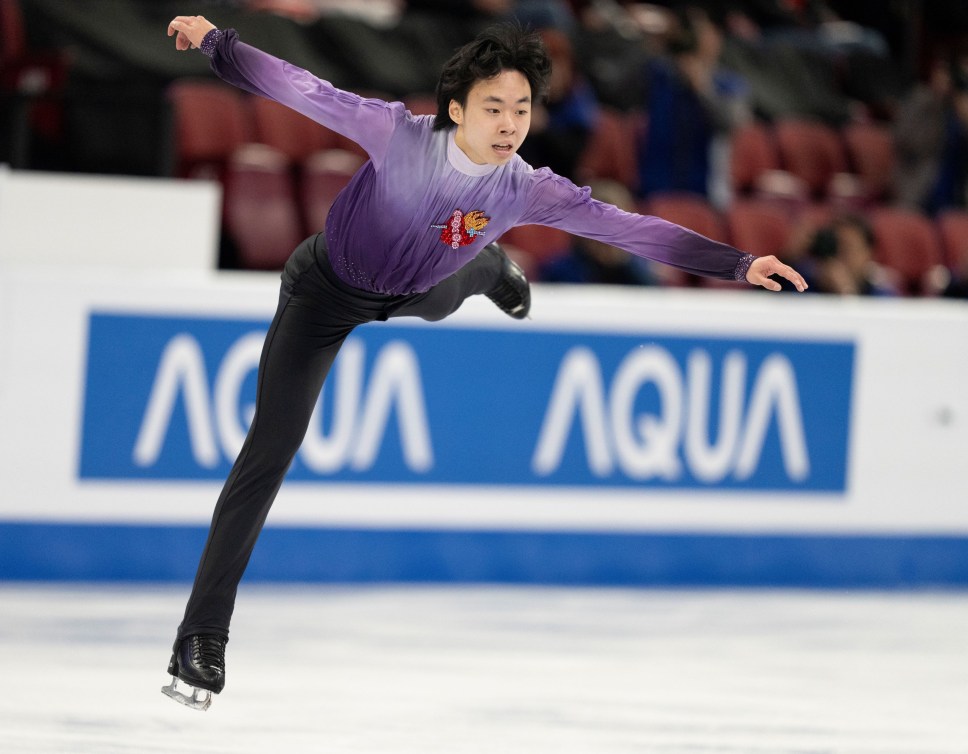
One goal for the Canadian men in Montreal is to hold onto two spots for next year’s world championships. After the short program, they’re in position to do so. They just need to complete their mission in the free skate.
New national champion Wesley Chiu is in 18th place after making one small error in his world championship debut. He downgraded the back half of his combination to a double toe after a bobble on the landing of the quad toe that preceded it.
“It’s so special,” said Chiu of the “once-in-a-lifetime opportunity” to compete at a world championships in Canada. “Just having finished a skate that I was proud of and with the fans behind my back, it’s something that you dream of as a kid and I’m basically living my dream.”

